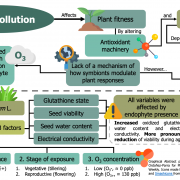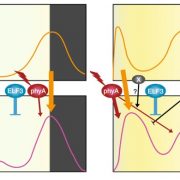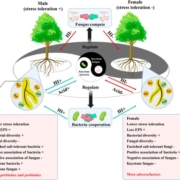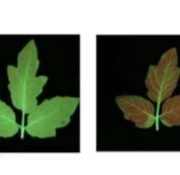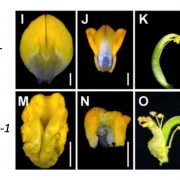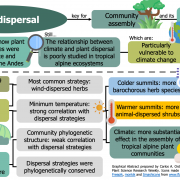Review: Paternal imprinting in Marchantia polymorpha
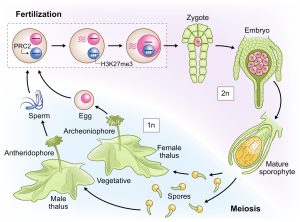 Humans and flowering plants spend most of their lives in a diploid state with two copies of each chromosome in most cells, but to reproduce they produce haploid gametes through meiosis. By contrast, bryophytes (liverworts, hornworts, and mosses), spend most of their lives in the haploid state. They produce gametes through mitosis and differentiation, and then very briefly experience a diploid state before meiosis leads again to the dominant, haploid state. The process of toggling between diploid and haploids is actually quite complicated, as some genes should only be active in one state or the other, or when inherited from one parent or the other. Shutting off of specific genes by parent-of-origin is known as imprinting, and usually involves the polycomb repressive complex and histone methylation (H3K27me3). Recently, Montgomery and Berger and colleagues identified a new type of selective gene silencing in the liverwort Marchantia, which involves the complete silencing of the paternal genome for the duration of the diploid stage – effectively rendering it haploid. This review discusses this novel finding in the context of other forms of imprinting and the evolution of land plants. Check it out! (Summary by Mary Williams @PlantTeaching) New Phytol. doi.org/10.1111/nph.19377
Humans and flowering plants spend most of their lives in a diploid state with two copies of each chromosome in most cells, but to reproduce they produce haploid gametes through meiosis. By contrast, bryophytes (liverworts, hornworts, and mosses), spend most of their lives in the haploid state. They produce gametes through mitosis and differentiation, and then very briefly experience a diploid state before meiosis leads again to the dominant, haploid state. The process of toggling between diploid and haploids is actually quite complicated, as some genes should only be active in one state or the other, or when inherited from one parent or the other. Shutting off of specific genes by parent-of-origin is known as imprinting, and usually involves the polycomb repressive complex and histone methylation (H3K27me3). Recently, Montgomery and Berger and colleagues identified a new type of selective gene silencing in the liverwort Marchantia, which involves the complete silencing of the paternal genome for the duration of the diploid stage – effectively rendering it haploid. This review discusses this novel finding in the context of other forms of imprinting and the evolution of land plants. Check it out! (Summary by Mary Williams @PlantTeaching) New Phytol. doi.org/10.1111/nph.19377


